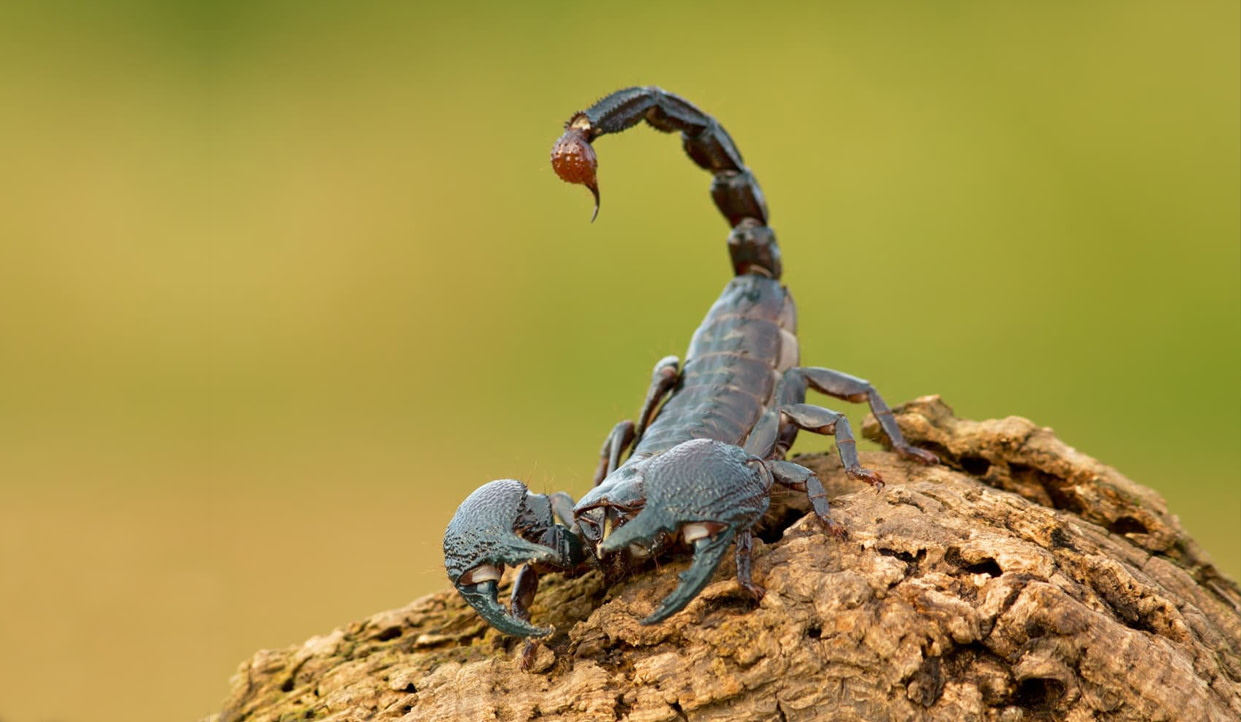 Listen to this article
•
15:34 min
Listen to this article
•
15:34 min
Scorpions trigger a fight-or-flight response in many of us. We are scared of being stung, scared of what the venom will do to us, the agony that will follow, and how we will respond to it. But mostly we are scared that our life will come to an abrupt and painful end, at the pincers of an animal less than one-hundredth our size.
The truth is there are only a handful of scorpion species with venom powerful enough to incapacitate adult humans. “And this too is debatable,” according to Zeeshan Mirza, a scientist at the National Centre for Biological Sciences in Bengaluru. Zeeshan has a particular fondness for spiders, scorpions, and snakes, “anything with venom”, and feels that we are sorely lacking in research on the subject. “We simply don’t have enough information to know whether scorpion fatalities are actually due to the venom, or the psychological stress of being stung by one. Fear alone can cause heart attacks, spikes in blood pressure, any number of responses,” he explains.
That is not to say that scorpions are harmless. India has about 130 known species, with newer specimens being added to the list every year. The Indian red scorpion is believed to be the most lethal species of scorpion in the world. Its sting can cause severe reactions, and in some extreme situations the accumulation of fluid in the lungs, which can lead to further complications and, in rare cases, death.
There are scorpions on every continent, except Antarctica, and in habitats ranging from arid deserts and grasslands to lush, evergreen forests with towering tree canopies.
Scorpions are viewed as crude and menacing, with their gleaming black bodies, and stingers hanging like a bulb from a lantern. In reality, scorpions are incredibly efficient animals, both in terms of design and lifestyle.
As far as their venom goes, it is intended for use upon insects, frogs, and small birds. Scorpion venom contains a cocktail of amino acids, histamines, and neurotoxins that incapacitate the victim and begin to break down its proteins. Every species has a slightly different concoction, fine-tuned for the prey in its habitat. Some might work best on grasshoppers, others on ants or beetles.
Inspired by this variation in venom, a group of scientists from Tel Aviv University created an insecticide using scorpion toxins. As Emily Sohn, author of an article on this research put it, “Scorpions are already really good at killing insects, after all. Why not copy what they do?” The benefits are manifold: Insecticide 2.0 is made from organic materials, does not contaminate water sources, and has the ability to target only certain insects, as compared to industrial options that harm all life, both good and bad.

Cover: Scorpions are distantly related to spiders, and play the crucial role of checking insect populations in their habitat. If it weren’t for their sting operations, we’d have a lot more bugs on our hands. Photo: Milan Zygmunt/Shutterstock
In a different part of the world, another group of scientists are working on a synthetic version of scorpion venom which illuminates brain tumours, giving medical professionals more clarity during diagnoses and surgery. Small quantities of the venom are also being used in experimental trials to fight cancer cells. So really, this vilified venom has actually inspired several scientific breakthroughs.
Benefits to the human race aside, scorpions are incredibly resilient: They live longer than most animals their size (up to 25 years in captivity), can withstand brutal landscapes, and are able to survive a year without any food or water. When they do eat, scorpions take their meals in the dead of night.
Through the day, they remain holed up in burrows or under rocks, far from the sun’s light, to which they are allergic. When darkness falls and bird call is replaced by the thrum of cicadas, scorpions emerge, stingers at the ready, to hunt and keep insect populations in check. It is the role they have played for 300 million years, and continue to fulfil to this day. “Examine scorpion fossils and you’ll see that their ancestors look almost exactly alike, except for size,” explains Zeeshan Mirza. “They were amazing predators a million years ago, and they are still amazing predators today.”





